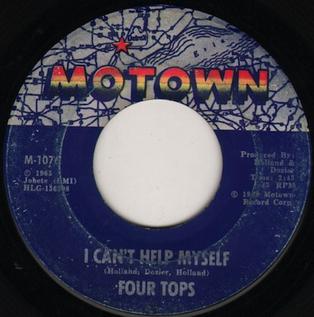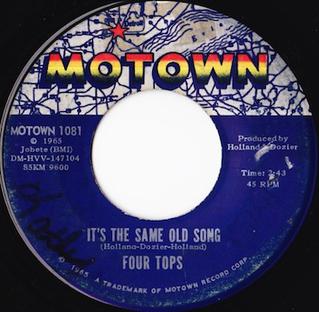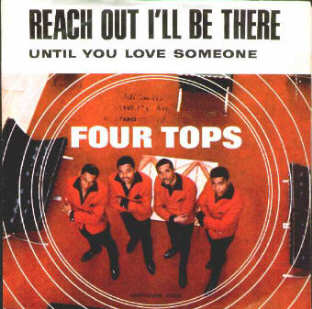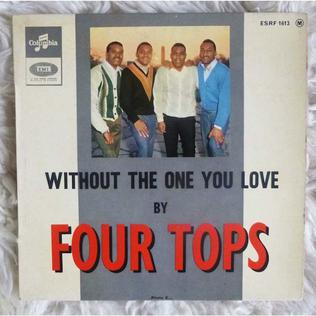
"Baby Love" is a song by American music group the Supremes from their second studio album, Where Did Our Love Go. It was written and produced by Motown's main production team Holland–Dozier–Holland and was released on September 17, 1964.

"I Hear a Symphony" is a 1965 song recorded by the Supremes for the Motown label.

"I Can't Help Myself (Sugar Pie Honey Bunch)" is a 1965 hit song recorded by the Four Tops for the Motown label.

"Baby I Need Your Loving" is a 1964 hit single recorded by the Four Tops for the Motown label. Written and produced by Motown's main production team Holland–Dozier–Holland, the song was the group's first Motown single and their first pop Top 20 hit, making it to number 11 on the US Billboard Hot 100 and number four in Canada in the fall of 1964. It was also their first million-selling hit single.

"It's the Same Old Song" was recorded by the Four Tops for the Motown label. It was released in 1965 as the second single from their second album. Written and produced by Motown's main production team Holland–Dozier–Holland, the song is today one of The Tops' signatures, and was reportedly created—from initial concept to commercial release—in 24 hours. It reached #5 on the Billboard Hot 100 and #2 on the Billboard R&B chart. It also reached #34 in the UK.

"Reach Out I'll Be There" (also formatted as "Reach Out (I'll Be There)") is a song recorded by the Four Tops from their fourth studio album Reach Out (1967). Written and produced by Motown's main production team, Holland–Dozier–Holland, the song is one of the most widely-known Motown hits of the 1960s and is today considered the Four Tops' signature song.

"Bernadette" is a 1967 hit song recorded by the Four Tops for the Motown label. The song was written and composed by Holland–Dozier–Holland, Motown's main songwriting team, and produced by Brian Holland and Lamont Dozier.

"Reach Out and Touch (Somebody's Hand)" is the debut solo single of singer Diana Ross, released in April 1970 as the first single from her solo self-titled debut 1970 album by Motown Records.
"Quicksand" is a song recorded by the Motown girl group Martha and the Vandellas. It was written by the songwriting team of Holland-Dozier-Holland and released as a single in November 1963.
"Love (Makes Me Do Foolish Things)" is a 1965 pop ballad by Motown girl group Martha and the Vandellas. A rare ballad for the group, whose forte was reportedly uptempo soul dance numbers including "Dancing in the Street" and "Nowhere to Run", the b-side to the group's single, "You've Been in Love Too Long", although the song only peaked at #70 on the Billboard Hot 100 singles chart and #22 on the Billboard Hot R&B singles chart, it was number one on many American urban radio playlists.The song, written and produced by Holland–Dozier–Holland, has the narrator explain why love makes her do things she later regrets. Cash Box described it as a "plaintive, slow-shufflin’ heart-throbber with a nostalgic years-back sound."

"For Once in My Life" is a song written by Ron Miller and Orlando Murden for Motown Records' Stein & Van Stock publishing company, and first recorded in 1965.
"If I Were a Carpenter" is a folk song written by Tim Hardin in the 1960s, and re-recorded with commercial success by various artists including Bobby Darin, The Four Tops and Johnny Cash. Hardin's own recording of the piece appeared on his 1967 album Tim Hardin 2. It was one of two songs from that release performed by Hardin at Woodstock in 1969. The song, believed by some to be about male romantic insecurity, is rumored to have been inspired by his love for actress Susan Morss, as well as the construction of Hardin's recording studio.

"Still" is a 1979 song by the soul music group the Commodores. It was released as a single on Motown Records with "Such a Woman" as the B-side. The song appears on their 1979 hit album Midnight Magic. It is notable for being their last No. 1 before Lionel Richie went solo.
"Once Upon a Time" is a 1964 single released by Marvin Gaye and Mary Wells from their sole duet album, Together. "Once Upon a Time' was written by Clarence Paul, Barney Ales, Dave Hamilton and William "Mickey" Stevenson. The song's co-writer, Dave Hamilton, also plays the vibraharp solo on the record.

"Forever Came Today" is a 1967 song written and produced by the Motown collective of Holland–Dozier–Holland, and was first made into a hit as a single for Diana Ross & the Supremes in early 1968. A disco version of the song was released as a single seven years later by Motown group the Jackson 5.

"Take Me in Your Arms (Rock Me a Little While)" is a song written by the premier Motown songwriting/production team of the 1960s Holland–Dozier–Holland. The first hit recording was sung by Kim Weston in 1965. It was most popular in 1975 when it was recorded by the Doobie Brothers.

"When the Lovelight Starts Shining Through His Eyes" is a song written by Holland–Dozier–Holland and recorded in 1963 by Motown singing group The Supremes. It is notable as the Supremes' first Billboard Hot 100 Top 40 recording, following seven previous singles between January 1961 and September 1963 which failed to enter the Top 40. The single is also notable as the first Supremes single written and produced by Holland–Dozier–Holland, who had previously created hits for Martha and the Vandellas and Mary Wells.

"Yesterday's Dreams" is a 1968 single recorded by The Four Tops for the Motown label. The song was written by Vernon Bullock, Jack Goga, Ivy Jo Hunter and Pam Sawyer. The single was one of the first the group released after the departure of Holland-Dozier-Holland, who had handled the majority of the Four Tops recordings prior to 1968. Released from the album of the same name, the song only became a modest hit on the US chart, peaking at #31 on Billboard's Best Selling Soul Singles chart and #49 on the Hot 100. Outside of the US, "Yesterday's Dreams" reached #23 in the UK.

"Never Had a Dream Come True" is a song written by Stevie Wonder and Motown staff songwriters Henry Cosby and Sylvia Moy, released as a single on the Tamla subsidiary in February 1970. Featured on his 12th studio release, Signed, Sealed & Delivered, as the lead single, "Never Had..." was a modest hit in the U.S. upon its release, debuting at No. 67 on the Billboard Hot 100 during the week of Feb. 7, 1970, and No. 11 on the R&B chart. The song received a boost in the U.K. where it eventually peaked at No. 6.

"Without the One You Love (Life's Not Worth While)" is a song written by Holland–Dozier–Holland and released as a single in 1964 by the Motown singing group The Four Tops as the second single from their self-titled debut album, Four Tops. The group would later cover the song with The Supremes.
















